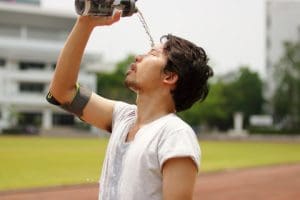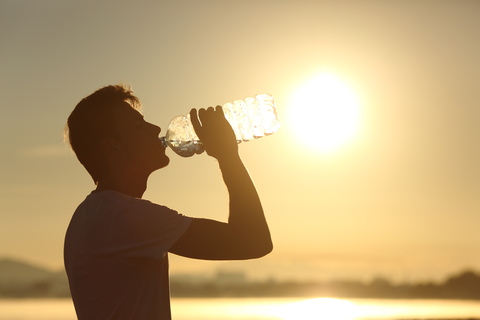How to Avoid Dehydration During Summer Workouts
 July is here and that means 4th of July celebrations, sport camps, summer workouts, and the home stretch for fall athletes doing their summer workouts! Working out during high heat creates it’s own set of issues that can effect performance. Frequent research has been able to demonstrate that heat can negatively impact marathon running performance from about 2% in elite competitors to as much as 10% in 3hr finishers(1), with similar results being seen in elite cyclists(2).
July is here and that means 4th of July celebrations, sport camps, summer workouts, and the home stretch for fall athletes doing their summer workouts! Working out during high heat creates it’s own set of issues that can effect performance. Frequent research has been able to demonstrate that heat can negatively impact marathon running performance from about 2% in elite competitors to as much as 10% in 3hr finishers(1), with similar results being seen in elite cyclists(2).
One of the quickest ways to ruin a summer workout is dehydration. In fact, even a loss of water of about 1.5-2% of a person’s BMI (Body Mass Index) can negatively impact their ability to play in sports like soccer(3), and prolonged exercising >1hr(4). Unfortunately, feeling thirsty is one of the signs of dehydration which also include dry mouth, irritability/crankiness, headache, seeming bored or disinterested, dizziness, cramping, excessive fatigue, and not being able to run or play as fast as usual(5). What to do if you feel you are dehydrated? Immediately move into a shaded or air conditioned area and start drinking fluids.
Here are some tips to help prevent dehydration from the National Athletic Trainers’ Association(6) and allow you to continue to perform at your best this summer:
- Consume 17-20 fl oz of water or sports drink 2-3 hrs before exercising.
- Consume 7-10 fl oz of water or sports drink 10-20 minutes before exercising.
- Consume 7-10 fl oz of water or sports drink every 10-20 minutes while exercising. (keep in mind you may require more depending on how your sweat rate and the weather conditions)
- To calculate your sweat rate:
- Weigh yourself with as little as possible on prior to exercising and again afterwards. a 2% loss would require additional fluid intake prior to your next workout. (2% loss equals 3lbs for someone weighing 150lbs, 4lbs for someone weighing 200lbs)
- Every pound lost equals 16oz that you should drink to rehydrate.
- Your goal should be to finish exercising and weigh within 2% of the weight you started exercising at.
- Another quick guide would be to look at the color of your urine. If it is dark yellow to tea like that would indicate you are dehydrated. Urine color should be light or pale yellow to almost clear.
Finally, if you feel any of the symptoms of dehydration SPEAK UP. Talk to your workout partner, coach, or athletic trainer immediately as dehydration is the first of other heat related illness that typically require greater levels of medical attention.
Following these simple guidelines could be the difference in keeping your competitive edge without compromising your health when training this summer.
Not sure if you are dealing with dehydration or another type of injury? Call to schedule a consultation with one of our Physical Therapists to ensure don’t miss any summer training time!
- 1.Ely MR, Cheuvront SN, Roberts WO, Montain SJ. Impact of weather on marathon-running performance. Med Sci Sports Exerc 39: 487–493, 2007.
- 2.Tatterson AJ, Hahn AG, Martin DT, Febbraio MA. Effects of heat stress on physiological responses and exercise performance in elite cyclists. J Sci Med Sport 3: 186–193, 2000.
- 3.Andrew M Edwards, Michael E Mann, Michael J Marfell-Jones, Dean M Rankin, Timothy D Noakes, David P Shillington. Influence of moderate dehydration on soccer performance: physiological responses to 45 min of outdoor match-play and the immediate subsequent performance of sport-specific and mental concentration tests. Br J Sports Med 2007;41:385-391
- 4.Cheuvront SN, Carter R 3rd., Sawka MN. Fluid balance and endurance exercise performance. Curr Sports Med Rep 2: 202–208, 2003.
- 5.Bass, P.F., Dozier, T. Heat Related Illnesses (Heat Cramps, Heat Exhaustion, Heat Stroke)” University of Rochester Medical Center. 2014
- 6.Casa D, Csillan D, Preseason Heat-Acclimatization Guidelines for Secondary School Athletics, J Athl Train. 2009 May-Jun; 44(3): 332–333.




